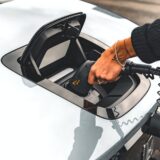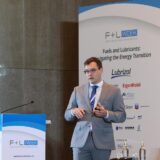
Duncan urges better lubricant education to cut emissions and boost efficiency
“We need to do a better job of educating end users to ensure they use the right oil for the right applications and don’t compromise their vehicles,” said Dave Duncan, global product line director at Richful, during his keynote address at ALIA’s 7th Anniversary and Exhibitor Appreciation Dinner held at the Four Seasons Kuala Lumpur on September 9. The dinner was part of the inaugural ALIA/F&L Asia Lubricants Exhibition being held at the Kuala Lumpur Convention Centre (KLCC) in Kuala Lumpur, Malaysia, from September 9-11.
Duncan expressed his frustration over the limited progress made in educating end users, especially when it comes to selecting the correct viscosity grade. There’s a big market out there using outdated technologies, and we can do better, he stressed.
The Richful representative highlighted the environmental impact of incorrect oil choices. Burning just 1 U.S. gallon of diesel fuel generates approximately 10 kilograms (kg) of carbon dioxide (CO2). A typical U.S. truck consumes around 20,000 gallons of diesel fuel per year, most of which use 15W-40 engine oils. By switching to a 10W-30 oil, users could see a 1% improvement in fuel efficiency, saving around 200 gallons of fuel annually per vehicle. This equates to reducing 2,000 kg of CO2 emissions—equivalent to planting 200 new trees.
For passenger cars, end users may put their vehicles at risk by inappropriately selecting lower-viscosity oils than recommended, says Duncan, adding that the labelling around 0W-8, 0W-12, and 0W-16 engine oils is confusing for many consumers.
In his presentation, Duncan acknowledged the important role of electric vehicles in addressing climate change but underlined that internal combustion engines will continue to play a key role. Many fleets still rely on traditional vehicles, and educating these users on proper oil selection is a simple way to reduce our environmental impact, he says.
He concluded by urging the industry to accelerate the implementation of solutions. Duncan highlighted the need for quicker product approvals and evaluations, noting that the rapidly evolving vehicle technology landscape demands faster action. To achieve this, he called for greater transparency and trust between oil companies, OEMs, and additive suppliers, including a more collaborative approach to risk management.
.jpg)











